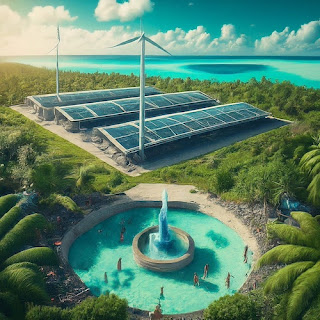Desalination and Water Conservation in Kiribati
Desalination and Water Conservation in Kiribati: A Future of Sustainability
Kiribati, a low-lying island nation, faces significant challenges related to water scarcity. Rising sea levels and saltwater intrusion threaten freshwater resources, making it imperative to explore innovative solutions. Desalination and water conservation technologies offer potential avenues for addressing these challenges while preserving Kiribati's traditional way of life.
Advanced Desalination Technologies
Future desalination plants in Kiribati could incorporate cutting-edge technologies that are more energy-efficient and environmentally friendly. Solar-powered desalination systems, for example, could harness the abundant sunlight to drive the desalination process, reducing reliance on fossil fuels. Additionally, membrane-based technologies, such as reverse osmosis, could be optimised to improve energy efficiency and minimise the environmental impact of brine discharge.
Water Conservation and Pollution Reduction
Water conservation is another crucial aspect of addressing Kiribati's water challenges. Implementing efficient irrigation systems, promoting water-saving practices in households and businesses, and investing in rainwater harvesting infrastructure could significantly reduce freshwater consumption. Furthermore, measures to prevent freshwater pollution, such as proper waste management and treatment, would help protect Kiribati's precious water resources.
Benefits for the Population
The implementation of desalination and water conservation technologies would have significant benefits for Kiribati's population. Access to clean, potable water would improve public health and reduce the burden of water-borne diseases. Additionally, these technologies could support economic development by ensuring a reliable water supply for agriculture, industry, and tourism.
Preserving Traditional Lifestyles
While adopting new technologies, it is essential to consider the potential impact on Kiribati's traditional lifestyles. It is important to balance innovation with cultural preservation. For example, traditional fishing practices and agricultural methods could be adapted to incorporate water-saving techniques, ensuring that the population can continue to rely on their ancestral knowledge while addressing the challenges of climate change.
Future Tips for Growth
To ensure the long-term sustainability of Kiribati's water resources, it is important to invest in research and development, promote education and awareness, and foster international cooperation. By investing in new technologies, supporting local initiatives, and building partnerships with other countries, Kiribati can secure a sustainable future for its population.




